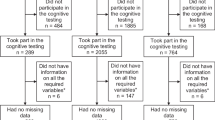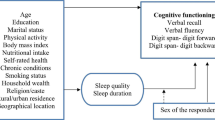Abstract
Today’s fast-paced lifestyle has led globally to an increase in sleep deprivation. Although the recommended amount of sleep in a 24 h period is 7–8 h, recent data show that almost 50% of Indians are sleeping 6 h or less and other countries are also reporting a decline in sleep duration. Neurocognitive function decreases in a dose-dependent manner with chronic sleep deprivation, which can impair productivity at work and in daily functioning. Various brain functions involving the frontal lobe can be assessed objectively by conducting a neuropsychology test battery. The research or data in the Indian population is lacking. Hence, this project evaluated neurocognitive functions in real-life setting sleep deprivation. The current study aimed to assess the effect of chronic sleep deprivation in the general public on various neuropsychology functions, mainly involving the prefrontal brain lobe. Volunteers were asked to wear Actiwatch and/to fill the sleep diary for seven consecutive days. The Neuropsychology test battery utilized included Psychomotor Vigilance Task, Forward Digit Span, Iowa Gambling Task, Tower of London, Wisconsin Card Sorting Test, Stroop, and Rey Auditory Verbal Learning Test. Results show that chronic sleep deprivation has the most significant effect on the younger generation as compared to older adults. There was no significant effect on the elderly population. Future large cohort studies are underway to substantiate the findings of this study.
Access this chapter
Tax calculation will be finalised at checkout
Purchases are for personal use only
Similar content being viewed by others
References
Shukla S.: “Waking up to sleep Therapy” Express Healthcare, June 2010
Devnani, P., Bhalerao, N.: Assessment of sleepiness and sleep debt in adolescent popultion in urban western India. Indian J. Sleep Med. 6(4), 140–143 (2011)
Rajaratnam, S.M.W., Arendt, J.: Health in a 24-h society. Lancet 358, 999–1005 (2001)
Chokroverty, S.: Overview of sleep and sleep disorders. Indian J. Med. Res. 131, 126–140 (2010)
Shah, N., Bang, A., Bhagat, A.: Indian research on sleep disorders. Indian J. Psychiatry 52, 255–259 (2010)
Shaikh, W., Patel, M., Singh, S.K.: Sleep deprivation predisposes Gujurati Indian adolescents to obesity. Indian J. Community Med. 34(3), 192–194 (2009)
Sharma, H., Sharma, S.K.: Overview and implications of obstructive sleep apnoea. Indian J. Chest Dis. Allied Sci. 50, 137–150 (2008)
Sharma, H., et al.: Pattern & correlates of neurocognitive dysfunction in Asian Indian adults with severe obstructive sleep apnea. Indian J. Med. Res. 132, 409–414 (2010)
Sharma, S.K., Ahluwalia, G.: Epidemiology of adult obstructive sleep apnoea. Indian J. Med. Res. 131, 171–175 (2010)
Surendra, S.: Wake-up call for sleep disorders in developing countries. Indian J. Med. Res. 131, 115–118 (2010)
Ramrakhiyani, V., Sanjay, D.: Study of the incidence and impact of chronic sleep deprivation in Indian population with special emphasis on neuropsychology testing. Indian J. Sleep Med. 14(2), 23–28 (2019)
Suri, J.C., Sen, M.K., Adhikari, T.: Epidemiology of sleep disorders in the adult population of Delhi: a questionnaire based study. Indian J. Sleep Med. 3(4), 128–137 (2008)
Udwadia, Z.F., et al.: Prevalence of sleep-disordered breathing and sleep apnea in middle-aged urban Indian men. Am. J. Respir. Crit. Care Med. 169, 168–173 (2004)
Balkin, T., Rupp, T., Picchioni, D., Wesenten, N.J.: Sleep loss and sleepiness: current issues. Chest 134, 653–660 (2008)
Murray, J.: New method for measuring daytime sleepiness: the Epworth sleepiness scale. Sleep 14(6), 540–545 (1991)
Banks, S., Dinges, D.: Behavioral and physiological consequences of sleep restriction. J. Clin. Sleep Med. 3(5), 519–528 (2007)
Durmer, J.S., Dinges, D.F.: Neurocogntive consequences of sleep deprivation. Semin. Neurol. 25(1), 117–129 (2005)
Rao, S.: Neuropyschology Test Battery Manual, National Institute of Mental Health Sciences (NIMHANS), Bangalore (2004)
Mueller, S.T., Piper, B.J.: The psychology experiment building language (PEBL) and PEBL test battery. J. Neurosci. Methods 222, 250–259 (2014)
Ulrich III, N.J.: Cognitive performance as a function of patterns of sleep, PEBL Technical report 2012-06 (2012)
Author information
Authors and Affiliations
Corresponding author
Editor information
Editors and Affiliations
Ethics declarations
All procedures performed in this study involving human participants were in accordance with the ethical standards of University of Mumbai, the institute and the research committee of Department of Life Sciences where the research was carried out as part of the Ph.D work. Further, informed consent was obtained from all individual participants included in the study.
Rights and permissions
Copyright information
© 2021 The Editor(s) (if applicable) and The Author(s), under exclusive license to Springer Nature Switzerland AG
About this paper
Cite this paper
Ramrakhiyani, V., Gandhi, N., Deshmukh, S. (2021). A Progressive Method Based Approach to Understand Sleep Disorders in the Adult Healthy Population. In: Abraham, A., Panda, M., Pradhan, S., Garcia-Hernandez, L., Ma, K. (eds) Innovations in Bio-Inspired Computing and Applications. IBICA 2019. Advances in Intelligent Systems and Computing, vol 1180. Springer, Cham. https://doi.org/10.1007/978-3-030-49339-4_19
Download citation
DOI: https://doi.org/10.1007/978-3-030-49339-4_19
Published:
Publisher Name: Springer, Cham
Print ISBN: 978-3-030-49338-7
Online ISBN: 978-3-030-49339-4
eBook Packages: Intelligent Technologies and RoboticsIntelligent Technologies and Robotics (R0)




